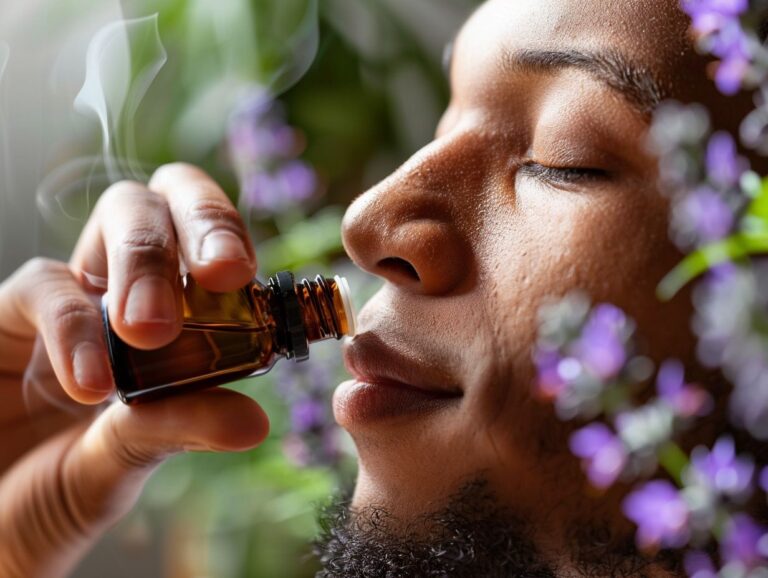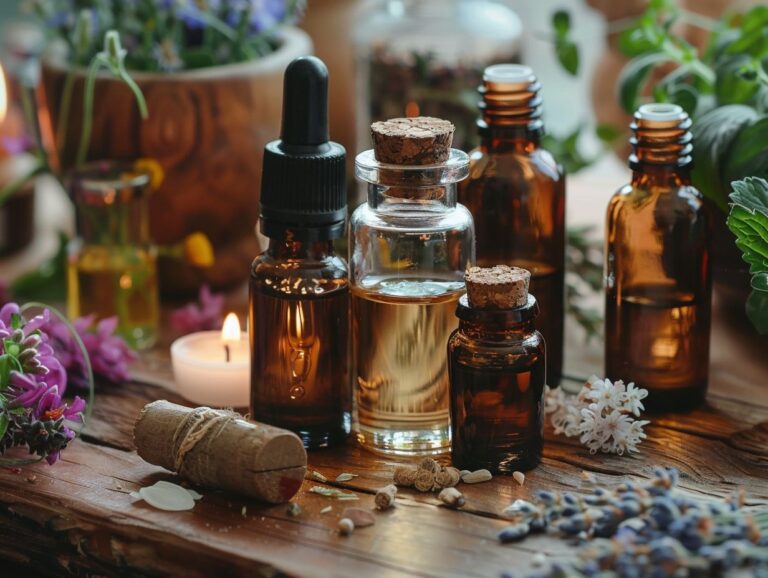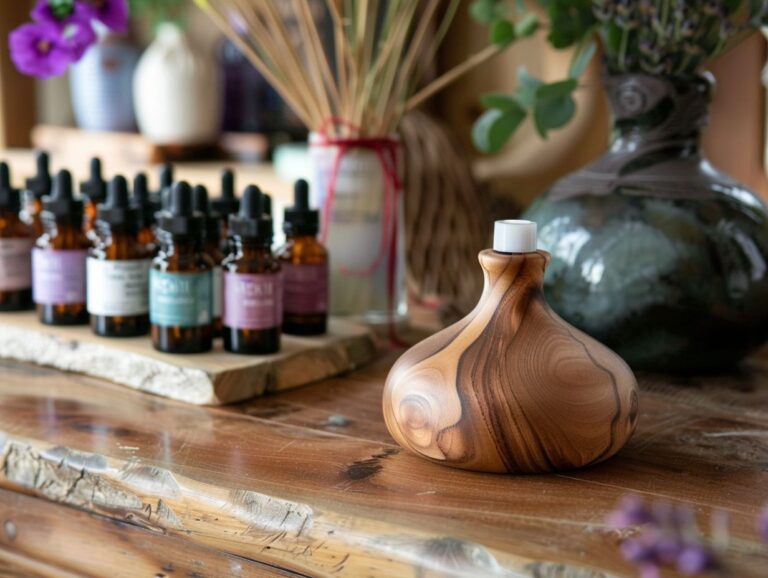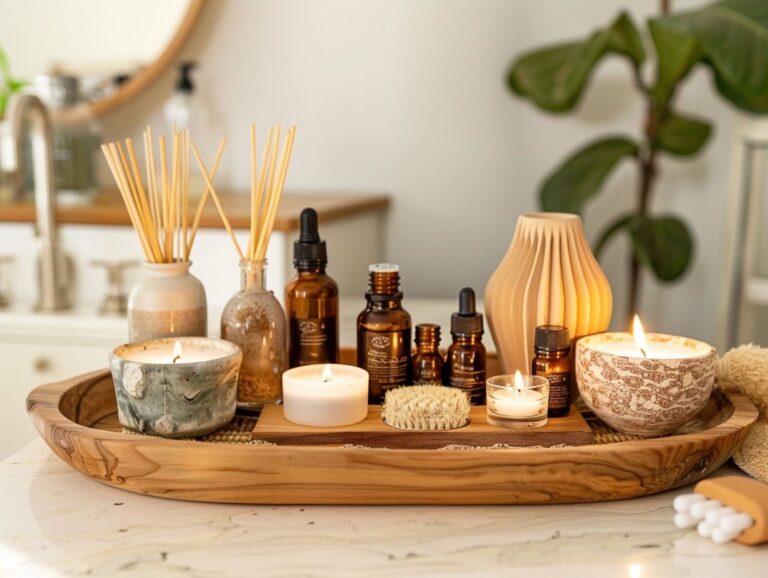Can I Use Aromatherapy Tea Tree Oil on My Skin
Aromatherapy tea tree oil has gained popularity for its numerous benefits for the skin.
From its antibacterial properties to its moisturizing effects, this essential oil offers a natural solution for various skin concerns.
Before incorporating it into your skincare routine, it is important to understand how to properly dilute and apply it to avoid potential risks and side effects.
We will explore the uses, benefits, risks, and proper application of aromatherapy oils on skin for all skin types.
Key Takeaways:
What Is Aromatherapy Tea Tree Oil?
Aromatherapy Tea Tree Oil, derived from the Melaleuca alternifolia plant, is a potent essential oil known for its numerous beneficial properties for skin health. It is widely used in skincare products due to its antimicrobial and anti-inflammatory effects.
The origins of Tea Tree Oil can be traced back to the indigenous Australian communities who used it for its medicinal benefits. Extraction of this oil involves steam distillation of the leaves and twigs of the Melaleuca alternifolia plant. The distillation process ensures that the therapeutic compounds, such as terpinen-4-ol and cineole, are preserved, enhancing its effectiveness. Apart from skincare, Tea Tree Oil is popular in aromatherapy for its invigorating and cleansing properties, making it a versatile natural remedy for various skin conditions.
How Is Aromatherapy Tea Tree Oil Used?
Aromatherapy Tea Tree Oil is commonly used in various skincare products and treatments for its effectiveness in addressing skin conditions. It can be applied topically on the skin to target specific concerns.
When using Tea Tree Oil in skincare, it is essential to dilute it with a carrier oil to prevent any skin irritation. One popular method is adding a few drops of Tea Tree Oil to a neutral carrier oil like coconut or jojoba oil before gently massaging it onto the skin. This helps in soothing redness, fighting acne-causing bacteria, and reducing inflammation.
The versatility of Tea Tree Oil extends to treating various skin issues such as acne, eczema, and fungal infections. Its antibacterial and anti-inflammatory properties make it a go-to solution for those with oily or acne-prone skin. Furthermore, Tea Tree Oil can also be added to homemade facial masks or used as a spot treatment for blemishes.
What Are the Benefits of Using Aromatherapy Tea Tree Oil on the Skin?
Using Aromatherapy Tea Tree Oil on the skin can offer a range of benefits, supported by scientific research and studies. These benefits include improved skin health, effective treatment for various skin conditions, and enhanced wound healing properties.
Tea tree oil is highly regarded for its antimicrobial properties due to its active component, terpinen-4-ol, which has been found to combat bacteria, fungi, and viruses on the skin. Studies have shown that applying tea tree oil topically can help reduce acne lesions and inflammation, making it a valuable natural remedy for acne-prone skin. Its anti-inflammatory effects can soothe irritated skin and provide relief from conditions like eczema and psoriasis.
Antibacterial Properties
Aromatherapy Tea Tree Oil exhibits potent antibacterial properties that make it effective against various strains of bacteria. Studies have shown its antimicrobial activity in combating skin infections and promoting a healthy skin microbiome.
Tea Tree Oil contains compounds like terpinen-4-ol, which play a crucial role in inhibiting the growth of harmful bacteria on the skin’s surface. This natural remedy has been used for centuries due to its remarkable ability to eliminate acne-causing bacteria and reduce inflammation. The oil’s proactive approach in targeting microbial invaders not only helps in clearing existing blemishes but also prevents future breakouts, making it a popular choice in skincare products.
The broad-spectrum antibacterial effects of Tea Tree Oil extend beyond just acne. It can be used to treat various skin conditions, such as eczema, psoriasis, and even fungal infections like athlete’s foot. By disrupting the cell membranes of bacteria, essential oils on skin effectively hinders their growth and replication, aiding in the overall health and hygiene of the skin.
Plus its direct antibacterial actions, Tea Tree Oil also possesses soothing properties that alleviate discomfort caused by infections. Its gentle nature makes it suitable for sensitive skin while still delivering powerful results in eradicating harmful bacteria. By incorporating Tea Tree Oil into your skincare routine, you can harness the benefits of its natural antibacterial prowess for clearer, healthier skin.
Anti-inflammatory Effects
The anti-inflammatory effects of Aromatherapy Tea Tree Oil help reduce skin inflammation and soothe irritations. Its calming properties make it beneficial for treating conditions like acne and eczema.
Tea tree oil contains compounds that have been shown to possess anti-inflammatory properties, which can help alleviate redness and swelling on the skin. These properties not only provide relief from irritation but also aid in promoting overall skin health.
The antibacterial and antifungal properties of tea tree oil make it effective in combating acne-causing bacteria, reducing breakouts, and preventing further skin inflammation.
People with sensitive skin or conditions like eczema can also benefit from the gentle soothing nature of tea tree oil, as it helps calm the skin without harsh side effects often associated with other treatments.
Moisturizing and Soothing Properties

Aromatherapy Tea Tree Oil possesses moisturizing and soothing properties that can alleviate dry skin issues and promote hydration. Its emollient effects help maintain skin softness and reduce dryness.
Tea tree oil serves as an excellent natural remedy for addressing various skin concerns, especially those related to dryness. Due to its lightweight consistency, it easily penetrates the skin to deliver nutrients and moisture deep within the layers, resulting in a revitalized and replenished complexion. Not only does it provide relief from itching and irritation, but it also helps in restoring the skin’s natural barrier, preventing further moisture loss. Incorporating this versatile oil into your skincare routine can work wonders in combating dryness and achieving a supple, nourished skin texture.
What Are the Potential Risks and Side Effects of Using Aromatherapy Tea Tree Oil on the Skin?
While Aromatherapy Tea Tree Oil offers numerous benefits, there are potential risks and side effects associated with its use on the skin. These may include skin irritation, allergic reactions, and sensitivity to sunlight.
It is important to be aware that Tea Tree Oil is highly concentrated, and direct application on the skin may lead to irritation, redness, and itching. Individuals with sensitive skin or existing skin conditions are more prone to experience these adverse effects. Some people may develop allergic responses to Tea Tree Oil, resulting in hives, rashes, or even swelling.
Another concern is the photosensitivity that can occur after using products containing Tea Tree Oil. This means that the skin becomes more sensitive to sunlight, increasing the risk of sunburns or skin damage. It is advisable to use sunscreen or protective clothing when using Tea Tree Oil topically to minimize this risk.
Skin Irritation and Allergic Reactions
Skin irritation and allergic reactions can occur in some individuals using Aromatherapy Tea Tree Oil, especially those with sensitive skin or allergies to essential oils. Patch testing is recommended before widespread application.
When using tea tree oil, it’s essential to recognize that even natural products can have side effects on the skin.
Patch testing involves applying a small amount of diluted tea tree oil to a discreet area and observing the skin’s reaction for 24-48 hours. If irritation, redness, itching, or swelling occurs, it may indicate a sensitivity or allergy to the oil. Individuals experiencing such symptoms should cease use and consult a healthcare professional for further guidance.
Essential oils are potent substances that can trigger reactions in susceptible individuals, making awareness and caution crucial to prevent adverse effects.
Sun Sensitivity
Aromatherapy Tea Tree Oil may increase sun sensitivity in some individuals, leading to a higher risk of sunburn or skin damage. Proper sun protection and skincare practices should be followed when using this oil.
When incorporating Tea Tree Oil into your skincare routine, it is essential to be aware of its potential effects on sun sensitivity. The phototoxic nature of the oil can amplify the skin’s reaction to UV rays, which could result in increased susceptibility to sunburn.
Therefore, always remember to apply a broad-spectrum sunscreen with an adequate SPF before going outdoors. Consider wearing protective clothing, such as hats and sunglasses, to shield your skin from the sun’s harmful rays.
Hormonal Imbalance
The use of Aromatherapy Tea Tree Oil in skincare products has been linked to hormonal imbalance concerns due to its potential to disrupt endocrine function. Individuals with hormonal issues should consult a healthcare professional before using this oil.
Tea tree oil’s impact on hormonal balance is a topic of growing interest in the skincare industry. Endocrine disruption, which can occur when synthetic chemicals interfere with hormone production, is a concern associated with this powerful essential oil. Hormones play a crucial role in regulating various bodily functions, including skin health.
Ensuring hormonal health is essential for maintaining overall well-being. While tea tree oil offers potential benefits for skincare, such as its antimicrobial properties, individuals with pre-existing hormonal conditions should be cautious.
Seeking medical advice prior to incorporating tea tree oil into your skincare routine is advisable, especially if you have concerns regarding hormonal balance or are undergoing hormone-related treatment.
How to Properly Dilute and Apply Aromatherapy Tea Tree Oil on the Skin?
Properly diluting and applying Aromatherapy Tea Tree Oil on the skin is crucial to prevent adverse reactions and ensure optimal effectiveness. Choosing the right carrier oil, maintaining the proper dilution ratio, and conducting patch testing are essential steps.
When selecting a carrier oil for tea tree oil, it’s important to opt for a non-comedogenic oil like jojoba or sweet almond oil to avoid clogging pores. The typical dilution ratio for tea tree oil is 1-2% in carrier oil; this translates to around 1-2 drops of tea tree oil per teaspoon of carrier oil. Always start with a lower concentration and adjust based on your skin’s sensitivity.
Choosing a Carrier Oil

Carrier oils play a crucial role in aromatherapy by acting as a base for essential oils like Tea Tree Oil. They are used to dilute potent essential oils, making them safe for direct skin application.
Choosing the right carrier oil is paramount as each oil carries its own benefits and properties. For instance, coconut oil is known for its moisturizing qualities, while jojoba oil closely resembles the skin’s natural sebum.
- Jojoba oil is non-comedogenic and suits oily skin types, making it an excellent choice for acne-prone individuals.
- On the other hand, almond oil is rich in vitamin E, promoting skin rejuvenation and hydration.
By blending Tea Tree Oil with a suitable carrier oil, you not only ensure safe application but also enhance the overall therapeutic effects for skin concerns.
Proper Dilution Ratio
Maintaining the proper dilution ratio of Aromatherapy Tea Tree Oil is crucial to prevent skin irritation and ensure safe application. Typically, a dilution of 1-2% tea tree oil in a carrier oil is recommended for topical use.
When preparing your tea tree oil mixture, remember that a higher concentration does not equate to better results; in fact, it can lead to adverse reactions. Mixing 5-10 drops of tea tree oil with 1 ounce of carrier oil like coconut or jojoba oil is a common practice.
Dilution ratios are essential as undiluted tea tree oil can be too potent for direct skin application, potentially causing redness, dryness, or even burning sensations.
- Always perform a patch test on a small area of skin before widespread use to check for any allergic reactions.
- Keep the dilution ratio in mind for different applications like skincare, haircare, or household cleaning.
- If you experience skin sensitivity, immediately rinse with a carrier oil, not water, to dilute the tea tree oil on your skin.
Patch Testing
Conducting a patch test before widespread application of Aromatherapy Tea Tree Oil is essential to assess skin sensitivity and potential allergic reactions. Apply a small amount of diluted oil on the skin and observe for any adverse responses.
Patch testing, a critical step in skincare routines, helps in identifying any skin reactions triggered by specific products like tea tree oil. This test involves applying a small amount of the diluted oil on a discreet area of the skin and monitoring for any redness, itching, swelling, or irritation. It is recommended to leave the patch on for at least 24 hours without getting it wet to accurately evaluate the skin’s compatibility with the oil. Observing any adverse reactions during this period can indicate potential sensitivity or allergies, prompting the need for further caution in use.
Can Aromatherapy Tea Tree Oil Be Used for All Skin Types?
Aromatherapy Tea Tree Oil is versatile and can be used for various skin types, addressing a range of skin concerns and conditions. Its adaptability makes it suitable for oily, dry, and sensitive skin.
For oily skin, Tea Tree Oil’s natural anti-inflammatory and antimicrobial properties make it effective in controlling excess oil production and reducing acne breakouts. It can help unclog pores and prevent further blemishes.
In terms of dry skin, the hydrating and soothing qualities of Tea Tree Oil can provide relief from itching, flakiness, and irritation, while also promoting skin regeneration.
Individuals with sensitive skin can benefit from the gentle nature of Tea Tree Oil, which can calm redness, inflammation, and allergic reactions without causing further irritation.
Oily Skin
Aromatherapy Tea Tree Oil is particularly beneficial for oily skin due to its ability to regulate sebum production and combat acne-causing bacteria. It can help reduce excess oiliness and promote clearer skin.
Tea tree oil’s sebum-regulating properties make it an ideal choice for individuals with oily skin types as it ensures a balanced oil level, preventing the skin from becoming excessively greasy. Its acne-fighting capabilities can aid in reducing blemishes and preventing future breakouts, contributing to a clearer complexion.
The effectiveness of tea tree oil in managing excess oil production can be attributed to its natural antibacterial properties, which target the root causes of acne, such as P. acnes bacteria, without stripping the skin of essential moisture.
Dry Skin
For individuals with dry skin, Aromatherapy Tea Tree Oil can provide moisturizing benefits and help alleviate dryness. Its hydrating properties nourish the skin, prevent flakiness, and promote a healthier complexion.
Aromatherapy Tea Tree Oil is known for its exceptional moisturizing effects on dry skin. When applied, it deeply penetrates the skin, replenishing lost moisture and restoring its natural balance. This essential oil has a lightweight texture that swiftly absorbs into the skin without leaving a greasy residue.
- Plus moisturization, Tea Tree Oil also possesses anti-inflammatory properties that soothe dry, irritated skin. By reducing inflammation, it helps in maintaining skin hydration levels and combating dryness effectively.
Regular use of Tea Tree Oil can significantly improve the overall condition of dry skin, making it softer, smoother, and more supple. Its ability to lock in moisture ensures long-lasting hydration, promoting a radiant and revitalized appearance.
Sensitive Skin

When dealing with sensitive skin, extra care is needed in using tea tree oil due to its potent nature. Diluting the oil with a carrier such as coconut or olive oil can help reduce the risk of adverse reactions on the skin. The recommended dilution ratio is usually 1-2% tea tree oil to carrier oil.
Before applying the diluted oil to a larger area, it’s advisable to conduct a patch test. Applying a small amount of diluted oil to a small area of skin, such as the inner forearm, and waiting for 24 hours can help determine if any irritation or sensitivity occurs.
Conclusion: Is Aromatherapy Tea Tree Oil Safe to Use on the Skin?
In conclusion, Aromatherapy Tea Tree Oil can be a safe and effective addition to skincare routines, offering natural solutions for various skin concerns and promoting overall skin health. When used properly and in moderation, this essential oil can provide significant benefits.
Tea tree oil, derived from the leaves of the Melaleuca alternifolia plant, is renowned for its antibacterial, antifungal, and anti-inflammatory properties. These natural properties make it a valuable ingredient in skincare products, aiding in the treatment of acne, eczema, and other skin conditions. Its effectiveness in reducing redness, inflammation, and blemishes has made it a popular choice for individuals looking for gentle yet potent solutions. Tea tree oil’s ability to soothe and heal the skin without harsh chemicals or synthetic additives underscores its appeal in promoting healthier skin.
Frequently Asked Questions
Can I Use Aromatherapy Tea Tree Oil on My Skin?
Yes, you can use Aromatherapy Tea Tree Oil on your skin. It has numerous benefits for the skin and is commonly used in skincare products.
What are the benefits of using Aromatherapy Tea Tree Oil on my skin?
Aromatherapy Tea Tree Oil has anti-inflammatory and antibacterial properties, making it great for treating acne and other skin irritations. It also helps to balance the skin’s natural oils and can reduce the appearance of scars.
How do I use Aromatherapy Tea Tree Oil on my skin?
You can dilute Aromatherapy Tea Tree Oil with a carrier oil, such as coconut or jojoba oil, and apply it directly to your skin. You can also mix a few drops into your moisturizer or facial cleanser for added benefits.
Is Aromatherapy Tea Tree Oil safe for all skin types?
Aromatherapy Tea Tree Oil is generally safe for most skin types, but it is always best to do a patch test before using it on your entire face. If you have sensitive skin, it may be best to dilute the oil with a carrier oil to avoid any potential irritation.
Can Aromatherapy Tea Tree Oil be used as a spot treatment for acne?
Yes, Aromatherapy Tea Tree Oil can be used as a spot treatment for acne. Its antibacterial properties help to kill acne-causing bacteria and reduce inflammation. Just apply a small amount directly onto the affected area.
Are there any precautions I should take when using Aromatherapy Tea Tree Oil on my skin?
While Aromatherapy Tea Tree Oil is generally safe for use on the skin, it is important to avoid getting it in your eyes or ingesting it. If you experience any irritation, discontinue use and consult a doctor. It is also best to avoid using it on broken skin or open wounds.








One Comment